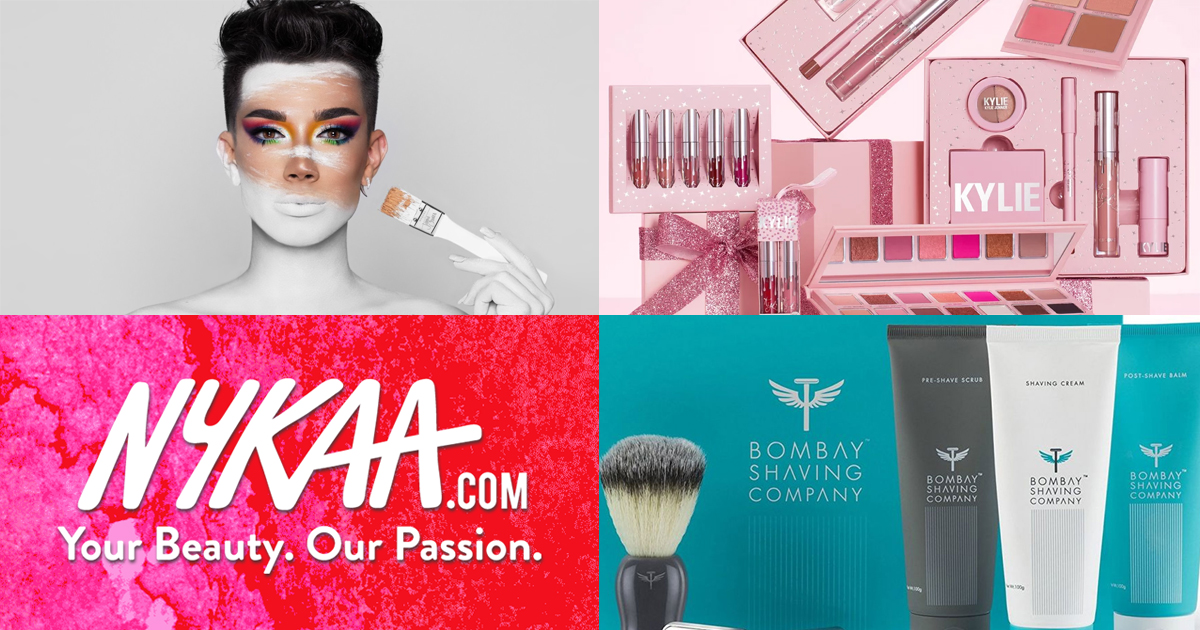Stories
Social Media Paves The Way For Cosmetic Entrepreneurs

Cosmetics are products that are used to enhance the appearance or to improve the texture and smell of a body. Makeup is one of the most important aspects of cosmetics and has seen a meteoric rise over the years in how the public perceived it and how it is affecting consumer behaviour. Gone are the days when makeup was applied behind closed doors in front of mirrors nor is it just limited to the female gender . Today, social media has successfully managed to strike down the reputation of cosmetics being attributed to only the ladies!
Impact of social media on the cosmetics industry
Before the advent of social media, television and offline media were the prominent avenues to promote makeup and cosmetic products. Not only that, but this was only limited to lipsticks, fairness creams and moisturisers. However, once the internet slowly started becoming available to people all across the globe, it became clear social media platforms have become very powerful tools to push products and services. When YouTube was released, several enterprising individuals realised putting up tutorials on how to apply makeup and use various cosmetics was a very good way to generate revenue.
Today, YouTube is the primary platform for aspiring entrepreneurs in the makeup space, to showcase their skills and gain subscriptions. In a way, it is safe to say social media also managed to empower people to break out of their shells and pursue their entrepreneurial passions. YouTube offered people the ability to make video tutorials and with the recent live feature that rolled out across most social media platforms, influencers and aspiring influencers can directly reach out to their followers and interact with them in real time and answer questions. Facebook and Instagram in particular have evolved into a thriving marketplace where buyers and sellers can connect with each other.
Social media also offered more refined ways to identify target audiences for a particular cosmetic product or service. Social media now has advanced ad targeting tools that let the advertiser have complete control over audience targeting. Information such as age and gender, as well as personal interests, and communication preferences, such as the types of devices they use. Other items that may be relevant include education level, location, and income will refine audience targeting for a particular cosmetic product or a service. The cosmetic industry has evolved into a $ 5.5 Trillion industry since the adoption of social media. India’s cosmetic industry is forecasted to exceed $ 20 Billion by 2025.
Cosmetic startups and entrepreneurs in the 21st century
When we look at the cosmetic landscape on social media now, it is quite easy to find startups offering various beauty and cosmetic products, bloggers making tutorials on how to use beauty products and cosmetic startups trying to adopt greener ways to create their products. Kylie Jenner is probably the most important example of how big cosmetic startups can grow. Kylie Jenner became the youngest billionaire in the world through her startup Kylie Cosmetics. Kylie also uses her social media accounts to do makeup tutorials as well. In India, cosmetic e commerce startup Nykaa is not easy to miss, with a strong online presence and loyal customer base as well as scaling up to open offline stores. Aggregator platform startup UrbanClap successfully provides a platform for beauty, cosmetics and skincare professionals to connect with their customers. Brands like Ustraa, Beardo, The Man Company, Bombay Shaving Company are some popular startups in India that cater exclusively for men, thereby proving that social media has made a visible impact on how cosmetics are perceived.
YouTube has paved the way for self made entrepreneurs who created their own brands. YouTube creators like Jeffree Star, Huda Kattan, James Charles, Tati Westbrook are just some of the prominent entrepreneurs who managed to use the video sharing platform to build their brands. Before becoming YouTube creators most of the influencers mentioned above started out by blogging about makeup. Once they adopted YouTube as a medium to reach out to a wider audience, most of the influencers began by launching their own products on YouTube videos which clicked with their audience. James Charles became famous when an yearbook photo of his in which he sports makeup went viral on Instagram. Charles then pivoted on that fame to launch a successful YouTube channel where he talks about various aspects of makeup.
The cosmetics industry is a constantly evolving space with more and more diverse products and cosmetic verticals popping up day by day. Green products are the current rage in the make up space which gave rise to enterprising Indians to fall back on their roots and come up with Ayurvedic cosmetics. While it is easy to keep on talking about how diverse the cosmetics industry is, there is no denying that the industry is here to stay.
Entrepreneur Stories
Zupee Bolsters Short-Video Play with Vertical TV Acquisition Under INR 40 Cr

Delhi NCR-based gaming startup Zupee has acquired Mumbai-based microdrama platform Vertical TV in a deal valued under INR 40 Cr. This move strengthens Zupee Studio, its short-video arm launched in September 2025, by integrating Vertical TV’s expertise in bite-sized dramas like romance and thrillers.
Facing challenges from India’s 2025 real-money gaming ban, Zupee valued at $1 Bn after raising $120 Mn has pivoted to non-gaming content, including recent layoffs of 40% of its workforce. The acquisition builds on its November 2025 purchase of Australian AI firm Nucanon for interactive storytelling, targeting its 200 Mn+ users with engaging, mobile-first formats.
This deal underscores the rising microdrama trend in India, helping Zupee diversify amid regulatory pressures and compete in the short-video space dominated by quick, shareable content for on-the-go audiences.
Videos
T.N. Seshan: The Fearless Reformer Who Redefined Indian Democracy

T.N. Seshan’s name stands tall in India’s history as the man who transformed the nation’s electoral system with extraordinary courage and integrity. Born in 1932 in Kerala, Seshan grew up with values of discipline, education, and service to the nation — virtues that shaped his illustrious journey. From his early brilliance at Madras Christian College to his advanced studies in public administration at Harvard University, Seshan’s path reflected rare determination and intellect. Joining the Indian Administrative Service in 1955, he built a reputation as a no‑nonsense officer committed to efficiency and honesty, serving in key roles such as Secretary of Defense and overseeing vital national programs.
As the Chief Election Commissioner of India in 1990, T.N. Seshan sparked a new era of electoral integrity. In a system once marred by corruption, violence, and malpractice, Seshan brought order, fear, and respect through his groundbreaking reforms. He introduced voter ID cards, imposed strict spending limits on campaigns, and insisted on transparency at every level of the election process. Despite criticism from political circles that labeled him dictatorial, his relentless pursuit of fairness empowered every citizen to vote fearlessly. Under his leadership, the Election Commission became a symbol of strength and integrity in Indian democracy.
Seshan’s passing in November 2019 marked the end of an era, but his message continues to resonate across generations. Leaders from every corner of the country mourned the loss of the man who restored faith in free and fair elections. His enduring legacy reminds us that true leadership lies not in wielding power, but in serving people with honesty, courage, and conviction. T.N. Seshan’s life remains a timeless inspiration a reminder that democracy thrives only when its citizens are vigilant, responsible, and fearless.
Entrepreneur Stories
Indian Man Quits JPMorgan, Takes 70% Pay Cut to Launch $6 Million Startup

Leaving behind a high-paying job at JPMorgan, an Indian entrepreneur embraced a 70% salary cut to pursue true purpose and passion in the startup world. Disenchanted with what he described as a “robotic” corporate routine, he sought meaningful work that made a real impact. This pivotal decision marked the beginning of his new journey, one focused on value creation rather than titles and corporate perks.
Powered by resilience and fresh perspective, the entrepreneur launched his own startup, prioritizing innovation and hands-on solutions. The road was challenging, but his vision resonated with the market: the startup quickly gained traction and raised $6 million—an impressive acknowledgement of its potential in a competitive landscape. Every hard lesson from early setbacks and bootstrapping paid off in real customer growth and investor confidence.
Today, his journey stands as an inspiring example for professionals seeking authentic success outside the corporate grind. By trading comfort for creative freedom, he grew a venture that solves important problems, generates jobs, and builds wealth beyond just salary. For ambitious founders, his story highlights the power of risk-taking, adaptability, and relentless focus on impact in India’s thriving startup ecosystem.













Solomon Reburn
April 14, 2025 at 4:40 pm
I think other web site proprietors should take this site as an model, very clean and wonderful user genial style and design, as well as the content. You’re an expert in this topic!
Rodney Dabato
May 3, 2025 at 3:10 am
You actually make it seem really easy together with your presentation but I find this matter to be really one thing that I believe I would by no means understand. It seems too complex and very wide for me. I am having a look forward on your subsequent publish, I?¦ll try to get the hold of it!
Hockey Matches Online
May 11, 2025 at 1:39 pm
amei este site. Para saber mais detalhes acesse nosso site e descubra mais. Todas as informações contidas são conteúdos relevantes e exclusivas. Tudo que você precisa saber está está lá.
vtc cdg
June 6, 2025 at 6:41 am
You are a very bright person!
qkelh
June 6, 2025 at 9:48 am
where can i get generic clomid without dr prescription cost cheap clomiphene without insurance where can i get cheap clomiphene without prescription cost cheap clomid without insurance buying clomid can you buy generic clomid without insurance where can i get cheap clomiphene pill
Cornelia Karcher
June 30, 2025 at 6:15 am
I¦ve recently started a blog, the info you provide on this website has helped me greatly. Thank you for all of your time & work.
Hawaii medical malpractice lawyer
July 24, 2025 at 6:41 am
Great V I should definitely pronounce, impressed with your website. I had no trouble navigating through all tabs and related info ended up being truly simple to do to access. I recently found what I hoped for before you know it in the least. Reasonably unusual. Is likely to appreciate it for those who add forums or anything, website theme . a tones way for your client to communicate. Excellent task..
scripts for plays
July 30, 2025 at 1:12 am
I?¦ve been exploring for a little for any high-quality articles or blog posts in this sort of area . Exploring in Yahoo I ultimately stumbled upon this site. Studying this information So i am satisfied to express that I have a very just right uncanny feeling I came upon exactly what I needed. I so much surely will make sure to don?¦t omit this web site and give it a glance on a relentless basis.
Ethernet Cable Installation near me san antonio tx
July 30, 2025 at 2:39 am
Some truly good info , Gladiolus I observed this. “Love consists in this, that two solitudes protect and touch and greet each other.” by Rainer Maria Rilke.
Grand Prairie ac repair
August 6, 2025 at 3:56 pm
hey there and thank you for your info – I have definitely picked up anything new from right here. I did however expertise some technical points using this website, since I experienced to reload the website lots of times previous to I could get it to load correctly. I had been wondering if your hosting is OK? Not that I’m complaining, but slow loading instances times will very frequently affect your placement in google and could damage your quality score if advertising and marketing with Adwords. Well I’m adding this RSS to my e-mail and can look out for much more of your respective interesting content. Ensure that you update this again soon..
web design
August 7, 2025 at 8:33 am
I was looking at some of your blog posts on this site and I conceive this website is real instructive! Keep putting up.
olxtoto alternatif
August 18, 2025 at 4:06 am
I consider something truly interesting about your weblog so I saved to bookmarks.
prediksi togel macau
August 18, 2025 at 4:58 pm
We’re a gaggle of volunteers and starting a brand new scheme in our community. Your website provided us with useful info to paintings on. You’ve performed a formidable job and our entire group shall be thankful to you.
situs toto 4d
August 23, 2025 at 12:04 am
wonderful issues altogether, you simply received a emblem new reader. What could you suggest in regards to your submit that you made a few days in the past? Any sure?
canon mallorca
August 24, 2025 at 1:31 am
Heya! I just wanted to ask if you ever have any trouble with hackers? My last blog (wordpress) was hacked and I ended up losing months of hard work due to no backup. Do you have any methods to stop hackers?
Alena Mcie
October 6, 2025 at 2:53 am
There are definitely a whole lot of particulars like that to take into consideration. That may be a nice point to convey up. I provide the ideas above as basic inspiration but clearly there are questions just like the one you bring up where an important factor will probably be working in honest good faith. I don?t know if finest practices have emerged round things like that, but I am sure that your job is clearly recognized as a good game. Each girls and boys feel the impression of just a second’s pleasure, for the remainder of their lives.
Delmy Barry
November 3, 2025 at 12:14 am
I reckon something truly special in this internet site.
J88
November 5, 2025 at 10:59 am
Đến với J88, bạn sẽ được trải nghiệm dịch vụ cá cược chuyên nghiệp cùng hàng ngàn sự kiện khuyến mãi độc quyền.
GO88
November 5, 2025 at 4:54 pm
Tham gia cộng đồng game thủ tại Go88 để trải nghiệm các trò chơi bài, poker phổ biến nhất hiện nay.
MM88
November 8, 2025 at 3:05 pm
Với giao diện mượt mà và ưu đãi hấp dẫn, MM88 là lựa chọn lý tưởng cho các tín đồ giải trí trực tuyến.
谷歌外推
November 9, 2025 at 12:11 pm
采用高效谷歌外推策略,快速提升网站在搜索引擎中的可见性与权重。谷歌外推
gelatin trick weight loss rebel wilson
November 9, 2025 at 5:46 pm
Write more, thats all I have to say. Literally, it seems as though you relied on the video to make your point. You clearly know what youre talking about, why waste your intelligence on just posting videos to your site when you could be giving us something informative to read?
站群程序
November 11, 2025 at 6:58 pm
搭载智能站群程序,自动化搭建与管理,为SEO项目提供核心驱动力。站群程序
link slot
November 12, 2025 at 12:31 am
Good day! Would you mind if I share your blog with my zynga group? There’s a lot of people that I think would really enjoy your content. Please let me know. Cheers
Jeni Sjogren
November 16, 2025 at 3:59 am
Yay google is my king aided me to find this outstanding website ! .
Kuwin
November 16, 2025 at 9:59 pm
kuwin sở hữu kho game đa dạng từ slot đến trò chơi bài đổi thưởng, mang đến cho bạn những giây phút giải trí tuyệt vời.
MM88
November 22, 2025 at 7:43 pm
Khám phá thế giới giải trí trực tuyến đỉnh cao tại MM88, nơi mang đến những trải nghiệm cá cược thể thao và casino sống động.
honey trick for memory loss
November 28, 2025 at 3:28 pm
This is very interesting, You are a very skilled blogger. I have joined your feed and look forward to seeking more of your great post. Also, I’ve shared your web site in my social networks!
iwin
November 30, 2025 at 10:57 am
iwin – nền tảng game bài đổi thưởng uy tín, nơi bạn có thể thử vận may và tận hưởng nhiều tựa game hấp
Odkryj jak
December 9, 2025 at 4:59 am
Nicely delivered
monopoly live download
December 11, 2025 at 8:07 pm
Hello! I could have sworn I’ve been to this blog before but after browsing through some of the post I realized it’s new to me. Anyways, I’m definitely happy I found it and I’ll be book-marking and checking back frequently!
Casino
December 14, 2025 at 2:14 pm
https://t.me/s/ezcash_officials
fdertol mrtokev
December 19, 2025 at 9:17 pm
I got good info from your blog
brandspace.id
December 25, 2025 at 4:24 pm
I very lucky to find this website on bing, just what I was searching for : D besides saved to fav.
MARTIN
December 25, 2025 at 5:45 pm
https://t.me/s/it_martin_cAsiNo
7kCasino
December 29, 2025 at 8:13 am
https://t.me/s/Officials_7K_Casino
Harris Orcutt
January 10, 2026 at 9:37 pm
A person essentially help to make severely articles I might state. That is the first time I frequented your website page and thus far? I surprised with the analysis you made to create this particular submit amazing. Fantastic task!
zaborna torilon
January 21, 2026 at 12:14 pm
I know this if off topic but I’m looking into starting my own weblog and was wondering what all is required to get setup? I’m assuming having a blog like yours would cost a pretty penny? I’m not very internet savvy so I’m not 100 certain. Any suggestions or advice would be greatly appreciated. Appreciate it
EnriqueKix
February 5, 2026 at 5:39 pm
home security no phone line https://otvetnow.ru lasik eye surgery kansas city
heepguau
February 6, 2026 at 3:41 am
https://askoff.ru